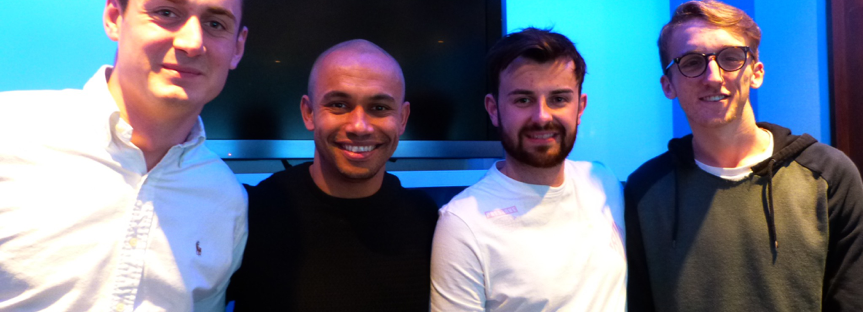MMU student interviews Danny Webber
- The former Manchester United striker, and current football agent visited Manchester Metropolitan University to give a talk to third year Sports Journalism students
- In a full interview with The NQ, Danny recalls who was the best player he played with, who was his best manager, and how young players' excessive contracts are becoming an issue in the modern game.
Webber spoke passionately about his career, how he started from a low-income background in Wythenshawe to playing under arguably the best football manager of all time in Sir Alex Ferguson.
Having signed a professional contract with Manchester United in 1998, Webber was sent out on loan to Port Vale and would make three appearances for the Manchester United senior team on his return, making his debut away at Sunderland. In 2001 Webber would move to Watford in search of regular first team football and it is at this level where Webber would find his form.
Webber went on to represent Sheffield United, Leeds United, Portsmouth, Doncaster, Accrington Stanley and finished his career at non-league outfit Salford City. He spoke honestly about the troubles he faced with injuries and how he believes that mentality is the most important factor in recovering and getting back out onto the pitch.
Webber has made inroads into a career within the media since impressing during a speech at last years' North West Football Awards. Danny was approached by a media agent and has since appeared on BBC Football Focus and Match of the Day as well as regular appearances on MUTV, with further opportunities in the pipeline.
The students were very lucky to be able to interview Webber on a range of topics, varying from his days as a player at Manchester United to his current occupation as a football agent, and the whole group felt that they had benefited from the experience.
Commenting on the experience, MMU student Sam Dunville said: “I really enjoyed Danny’s talk, he was an extremely engaging individual and I was particularly interested in what he had to say about his aspirations to nurture young talented players in the way that his father and coaches did for him.
"I felt that Danny’s knowledge of the media that he passed onto us was extremely helpful and I believe we now have more of an idea about the way the industry works.”
MMU lecturer Paul Clarke furthered these sentiments: “It was really good to get someone of Danny Webber's calibre in as he’s building up his media portfolio. You never know where he’s going to go, he could pop up on Sky or the BBC again in the near future so it was fantastic to get him in.”
Danny Webber left a real impression on everyone in attendance at his talk and a more in-depth insight into his career and the interview that took place at the University will be available on the website in the coming days.
The full interview with Danny is below:
NQ: How is it dealing with injuries as a professional footballer? Is it tougher mentally or physically?
DW: I’d say mentally, because if you aren’t prepared to mentally do the work, to mentally work through the pain barrier, then you’ll never physically recover.
NQ: Who was the best player that you played with?
DW: Paul Scholes. Paul Scholes, Ryan Giggs and David Beckham were the three that stood out for me. As a striker, you first need players to see your run, but secondly have the ability to find you with a pass and the way that those three did it was unbelievable.
NQ: Who’s your favourite manager that you played under?
DW: Sir Alex Ferguson. You couldn’t help but absorb good standards from him and want to be the best that you could be underneath him. He was the sort of person that was relentless in demanding good standards from you.
NQ: What sort of sacrifices did you have to make when you were younger to become a professional footballer? Perhaps having to stop going out with you friends?
DW: I didn’t have to stop going out with my mates, but I didn’t do things to excess. You sort of draw your own picture of what its like to be a professional footballer, for example, going to bed early, doing your pre-match preparation and having your boots clean and ready for the game in the morning, these are all standards my Dad instilled in me from a young age.
NQ: Can young players careers spiral out of control if they allow fame to get into their heads?
DW: I think that it’s a problem now more than ever. A 17-year-old lad could have access to a five-litre car and live a certain lifestyle quicker than he should be. I think its partly social media based but also certain agents telling their young players that they’re going to be the next big thing certainly doesn’t help their development and their commitment to fulfilling their potential. It is essential that an agent has the correct motive.


